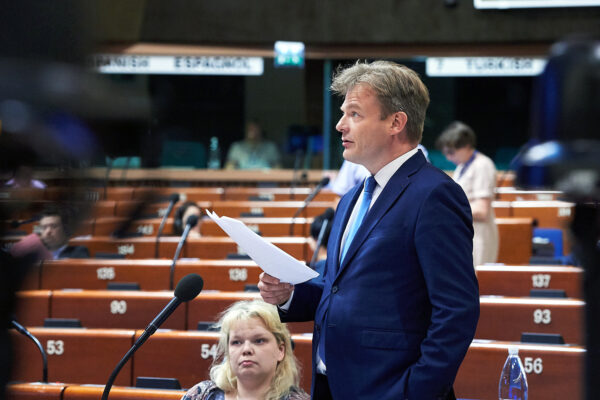
Dutch parliamentarian Pieter Omtzigt has thrown the November election in the Netherlands wide open by announcing the formation of a new political party.
His New Social Contract would replace the conservative Farmer-Citizen Movement (BBB) as one of the three parties vying for first place. The others are outgoing prime minister Mark Rutte’s People’s Party for Freedom and Democracy (VVD), led by Justice Minister Dilan Yeşilgöz, and the joint Labor Party-Green list, led by EU commissioner Frans Timmermans.
Omtzigt would cut support for the BBB in half, reducing the agrarians to sharing fourth place with Geert Wilders’ far-right Freedom Party (PVV).
Omtzigt’s unconventional mix of left- and right-wing policies would also enable him to lure voters away from the Socialists. And it opens up more possibilities for a coalition government after the election.
Omtzigt’s priorities
New Social Contract has yet to publish a manifesto, but Omtzigt’s priorities can be gleaned from his public and written statements:
- Ensure energy, food, health care and housing are affordable on minimum wage or welfare.
Currently 1 out of 18 million Dutch people are unable to pay their bills.
- Switch to a Danish-style electoral system with a majority of regional deputies supplemented by national seats to ensure proportionality.
All 150 members of the Dutch lower house are elected nationally. Omtzigt believes many have lost touch with the countryside. The 75 members of the upper chamber are indirectly elected by provincial deputies, but they don’t have the power to initiate legislation.
- Reduce immigration by cutting tax benefits for expats, halving slots for international students and giving some refugees shorter residence permits.
220,000 immigrants settled in the Netherlands last year, up from 100,000 in 2021. Distinguishing between permanent and temporary asylum is also a priority for the VVD (of which I am a member).
- Simplify the tax code by eliminating deductions and exemptions.
The biggest is the home mortgage interest deduction. There are also tax breaks for electric vehicles and uninsured health-care costs.
- Oppose further monetary integration in the EU, such as debt-sharing.
Mainstream center-right parties also oppose eurobonds, but Rutte agreed to partially finance the EU’s COVID-19 recovery program with jointly issued debts.
- Oppose the expropriation of farmers to reduce pollution.
This puts Omtzigt on the side of the BBB. The threat of one in three Dutch livestock farmers losing their business in order to shield EU-designated conservation areas from ammonia pollution is the main reason the BBB won the provincial elections in March.
Unlike the BBB, Omtzigt is no friend of factory farming. He often votes with the left on animal welfare.
Quit Christian Democrats
A former Christian Democrat, Omtzigt left his party shortly after the 2021 election, in which he had been bypassed for the leadership.
Omtzigt narrowly lost an internal leadership election in 2020 with 43.9 to 50.7 percent support for then-health minister Hugo de Jonge. When De Jonge resigned as leader after six months to focus on the COVID-19 pandemic, party leaders picked Finance Minister Wopke Hoekstra, not Omtzigt, to take his place without polling members.
Omtzigt won 342,000 votes in the election, enough for five seats. Polls suggest the Christian Democrats would struggle to win more than seven seats without him.
Could be kingmaker
Polls three months out from an election aren’t usually predictive in the Netherlands. Only a third of voters are loyal to a party. 10 to 20 percent don’t make up their minds until the final days of the campaign. Parties have yet to finalize and release their manifestos, and televised debates between party leaders can also make a big impact.
That said, the latest surveys hint at a pivotal role for New Social Contract after the election. Omtzigt says he has no interest in becoming prime minister, but he could be kingmaker.
A week ago, it looked like the VVD might have to choose between a coalition with the BBB and PVV, which would allow it to reform immigration but not agriculture, and a coalition with the left, which could keep climate policies and farm reforms on track at the expense of stricter immigration laws.
Yeşilgöz divided opinions in her party by opening the door to a deal with the PVV, arguing the liberals should reserve judgement until Wilders publishes his election program. Rutte had kept that door closed for eleven years after Wilders withdrew his support from a minority center-right government in 2012.
Omtzigt’s party could make a center-right government without the PVV possible or join a centrist coalition with the VVD and Labor-Green. A coalition of the VVD, BBB and Labor-Green is far less likely. The BBB scarcely acknowledges the need for farm reforms.
Either scenario would need a fourth party for a majority. Sixteen are projected to win seats, ranging from the animal rights party on the left to the pro-European D66 in the center to the pro-Putin Forum for Democracy on the far right.
